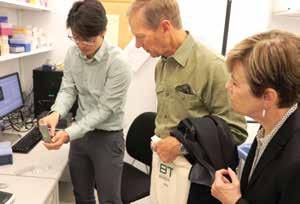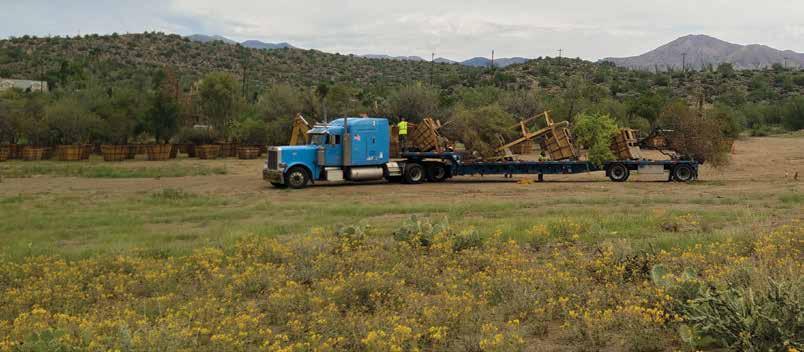
3 minute read
A Visit to Our Sister Institution, Boyce Thompson Institute
Text by Lynne Nemeth, Executive Director Photos by Mike Carroll, BTI's Communications Associate
Together, We Will Identify Pertinent Research Questions and Keep William Thompson's Mission Alive
Advertisement
On my very first day as BTA’s Executive Director, I already had mail waiting for me: a welcome letter and invitation to visit from the President of Boyce Thompson Institute, David Stern. In October, I traveled to BTI, which is located on the campus of Cornell University in Ithaca, NY.
As the very first director of BTA to visit BTI, I was invited to sign the Guest Book—a tradition for “important” visitors. I am honored to have my name—and BTA’s—in the book that dates from 1924.
My visit included a tour, a briefing on three research projects, and various meetings. I met individually with David Stern, the BTI Senior Leadership Team (David Stern, Paul Debbie, Director of Research and Business Development, and Stephanie Meyer, Vice President for Institutional Advancement), BTI’s greenhouse manager, Brian Bell, and researchers Susan Strickler and Fay-Wei Li.
Boyce Thompson Institute’s mission, “to advance and communicate scientific discovery in plant biology to improve agriculture, protect the environment, and enhance human health,” specifies that the goal of plant science is to benefit society. William Boyce Thompson believed that people’s basic needs for food, clothing, and shelter must be met before greater social goals of education and political stability can be met. He wanted the scientists at the Boyce Thompson Institute to explore the mechanisms of the most elemental life processes, and knew that this progress would ultimately provide the foundation upon which many discoveries could be made.
As William Boyce Thompson would have wanted, Greg Martin’s lab at BTI studies tomato speck, Pseudomonas syringae pv. tomato, a common bacterial disease that occurs worldwide wherever tomatoes are grown. The disease can substantially reduce crop yields, obviously affecting food supply. Martin’s lab utilizes genomics, molecular biology, plant breeding, plant pathology and structural biology, among other fields, to develop plants with increased natural resistance to diseases. One way they are doing that is by back-breeding domestic tomato breeds with wild relatives that have natural immunity. I saw greenhouse after greenhouse filled with different varieties of tomatoes and tomato relatives as researchers attempt to develop those disease-resistant plants.
BTI researchers have also taken on another disease, this one with great potential for ecosystem disruption. Beech bark disease is found on American beech (Fagus grandifolia) and on European beech (Fagus sylvatica). The disease, which results from the interaction between a scale insect and canker fungi, is found in mixed-hardwood forests. The effects of the disease are severe cankering on beech trees, deformation of the stem, and eventual tree death. Beech trees are an important species in the northeast forest—and a major food source for many mammals and birds, including squirrels, chipmunks, black bear, deer, and foxes. Researchers are working to identify the genome sequence of the beech, particularly those trees that exhibit a resistance to the insect scale.
One of my goals is to develop a research program at Boyce Thompson Arboretum, and I spoke with David Stern and other BTI staff about it. BTA and its various collections of 18,900 plants offer opportunities for many different kinds of research—from studying genome sequencing to monitoring the effects of climate change. My time at BTI included enthusiastic discussions about how we (BTA and BTI) need to identify mutually beneficial projects and pertinent research questions. As we continue to build a research program at BTA, our colleagues and friends at BTI will help us—with ideas, contacts, and enthusiasm. I look forward to our continued dialogue. You can visit Boyce Thompson Institute at www.btiscience.org.

Scientist Fey Wei shows visitors a pocket-size DNA sequencer.

Greenhouse Director Brian Bell.

Lynne Nemeth signs the BTI Guest Book.







